
xBridge

xBridge drives innovation at ACAA, developing and testing new technologies, processes and systems to positively impact revenues, operations, security, customer experience, and sustainability.
We develop new technologies in-house as well as partner with early-stage companies to meet current needs and support the new terminal slated to open in 2025.
The broad airport ecosystem enables innovations across many industries such as parking, logistics, retail, food and beverage, customer experience, security, sustainability, building management, and more.
The partnership between xBridge and startups is unique. Learn more below.
Work with xBridge
- Work with a friendly early customer who knows startups
- Design your paid pilot with us to meet your goals: validation, data collection, etc.
- Test your tech across multiple markets and applications all in one place
- Gain a wide audience: PIT is estimated to see 8 million passengers in 2023
Want to pilot your tech with us?
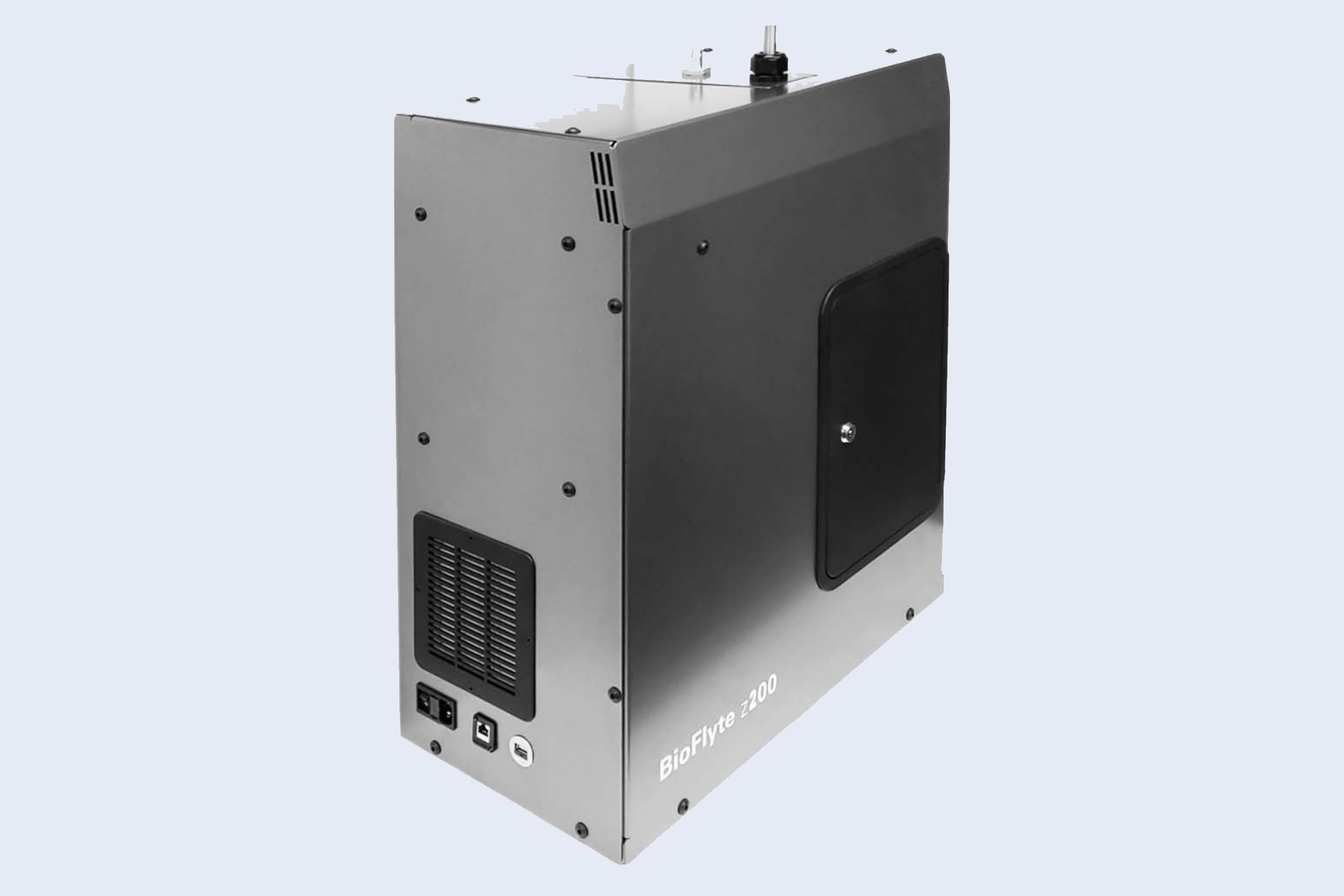
Bioterrorism Threat Detection
BioFlyte has developed a bio-aerosol surveillance sensor that can quickly detect and identify airborne bioterrorism threats such as ricin, anthrax and fentanyl in less than five minutes. BioFlyte is currently deployed with the Department of Defense, the Department of Homeland Security, and a Fortune 100 investment banking firm. During their proof of concept at PIT, Bioflyte’s BioTOF z200 sensor has been installed in an HVAC mechanical room where it collects data on return air from the terminal. Additionally, BioFlyte has tested simulations of threats at PIT to prove that the sensor can detect them.
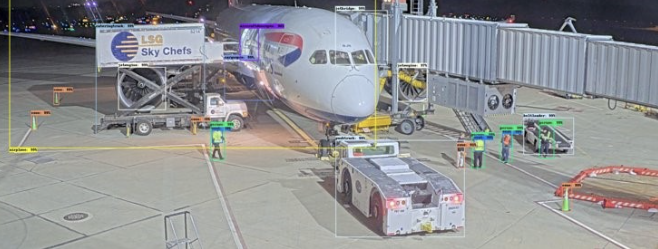
AI Platform for Airport Operations
Synaptic Aviation is a technology company utilizing a revolutionary AI platform for object detection and computer vision technology to monitor and log ramp operations via cameras stationed at a gate. Synaptic’s automated real-time service alerts and customized reports empower transportation teams with data-driven recommendations to make them greener, more efficient, and safer. During their proofSynap of concept at PIT in partnership with IAG (International Airlines Group), Synaptic’s ROOT Turnaround Platform is being utilized at three common use gates to track and log operational activities.
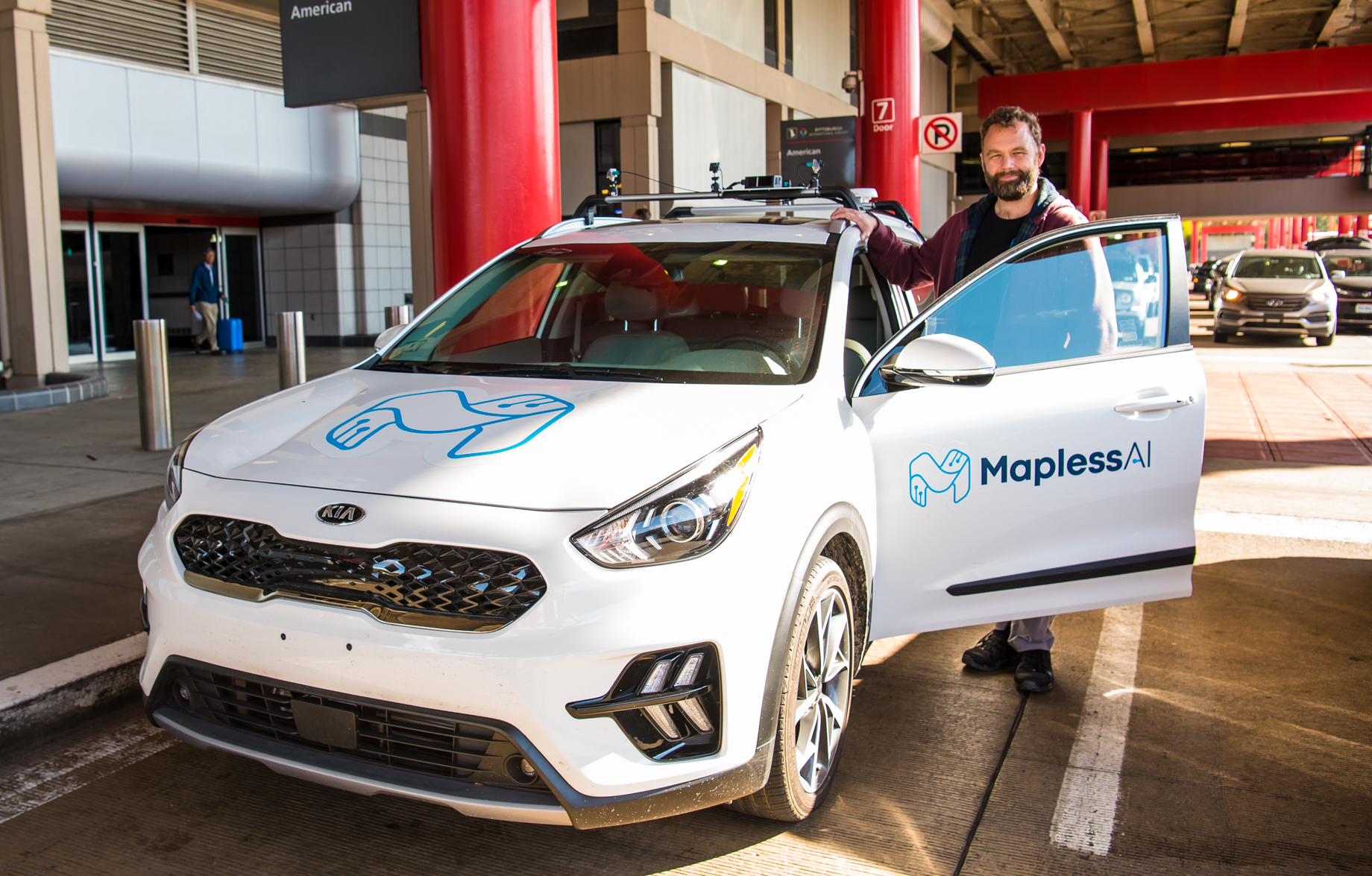
Tele-operated Semi-autonomous Fleet Management
Mapless AI has developed technology that converts regular vehicles into remote-controlled cars with no impact to the vehicle. During their trial at PIT, employees used an app to hail tele-operated Mapless cars for rides back and forth between the Long Term parking lot and the terminal. Mapless also tested their vehicles on the lots and roadways at PIT, including while shuttling passengers from downtown to the airport.
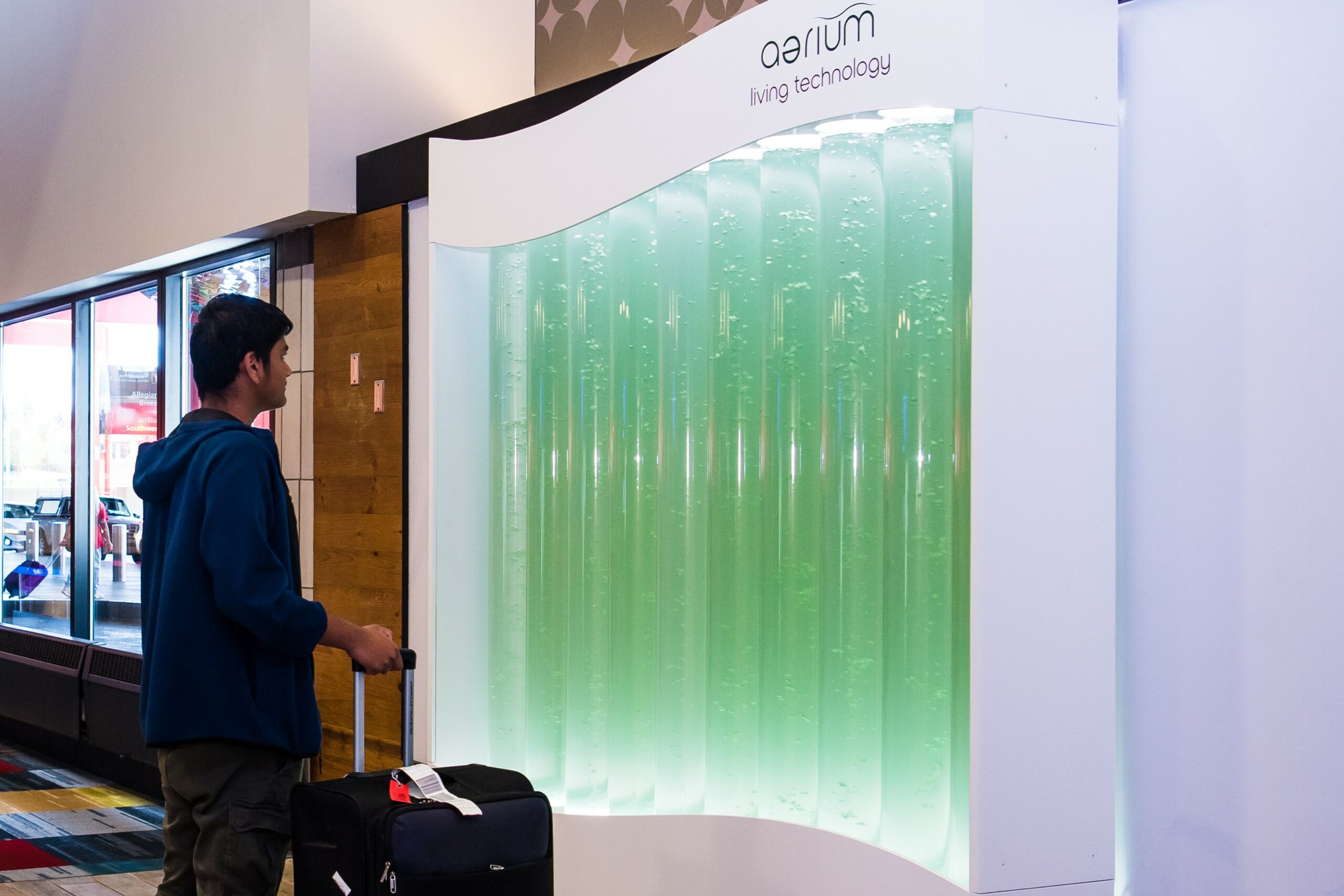
Utilizing Live Algae for Indoor Air Oxygenation
AlgenAir has developed and built its first commercial-sized aerium for installation at Pittsburgh International Airport. The aerium harnesses the natural power of algae to reduce carbon dioxide (CO2) and produce oxygen (O2), combating indoor air pollution. The 100-gallon system has hundreds of billions of microalgae cells growing inside, which is the equivalent of the air purification capacity of 4,500 house plants.
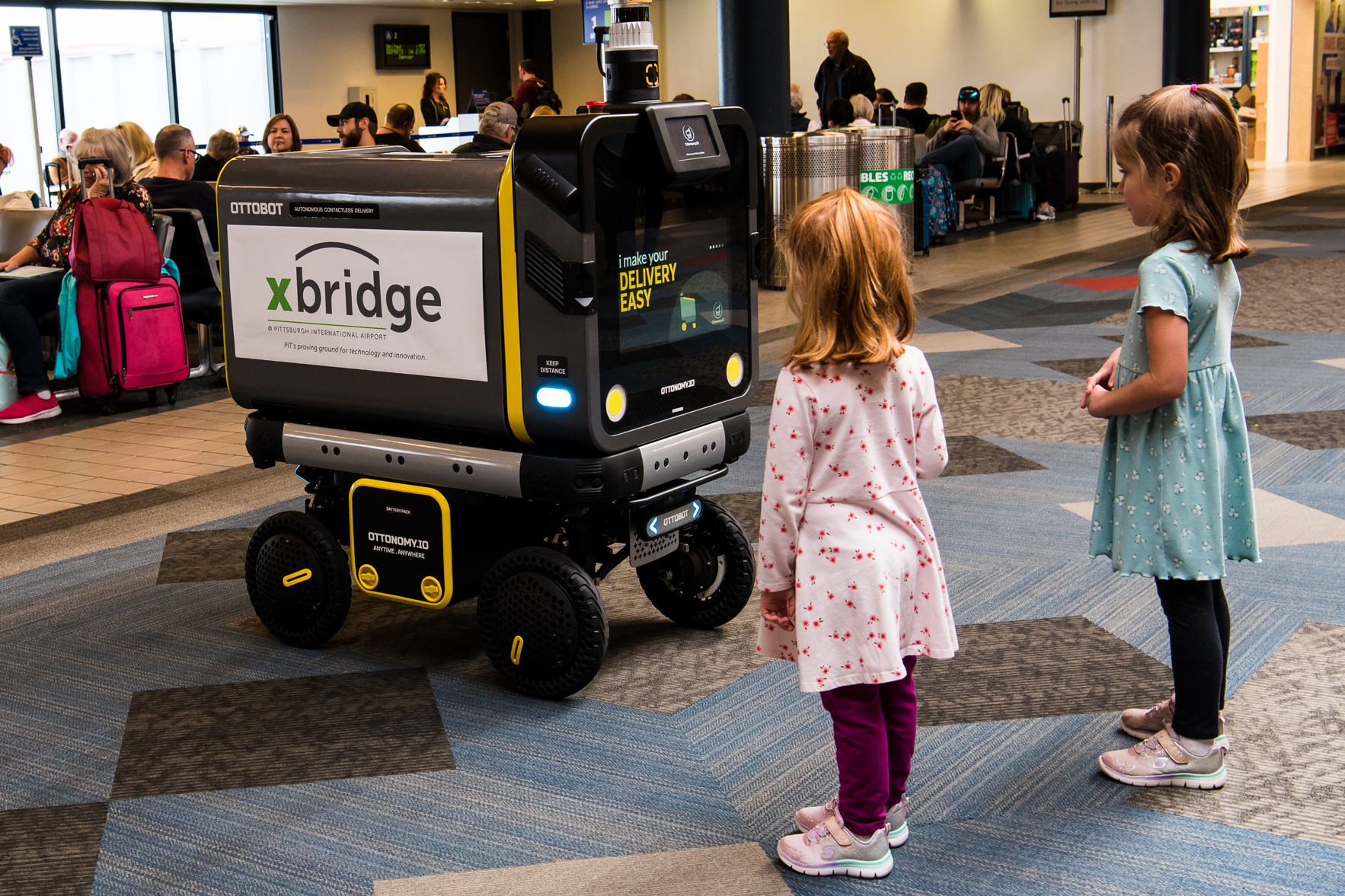
Autonomous Food Delivery Robots
Ottonomy has developed an autonomous delivery robot for food, beverages, and products. These robots first map a location, and the accompanying app is customized for the restaurants/stores in that environment. Customers can then use the app to dispatch the robot to a restaurant/store to pick up an order and bring it to the customer’s location.
During Ottonomy’s Proof of Concept at PIT, passengers were invited to use an app to order an item from a pre-defined menu. Ottonomy staff loaded the ordered item into the robot, which then traveled autonomously to deliver the item to the customer, and back to its station.
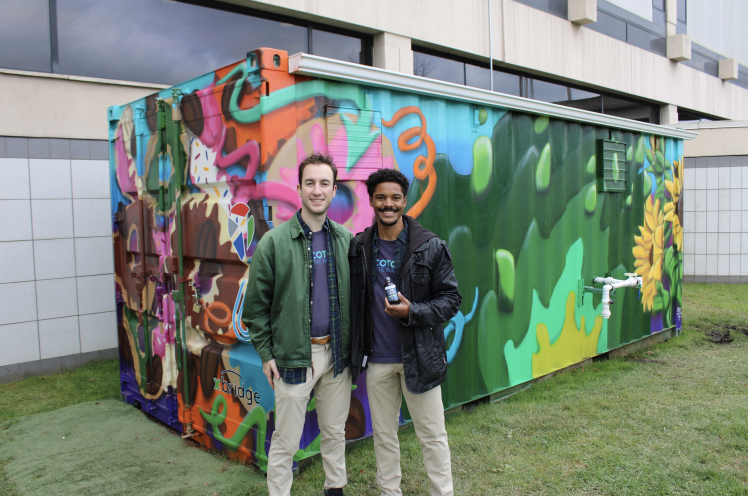
Turning Food Waste into Fertilizer
Ecotone Renewables is a green technology company that has developed an anaerobic digester inside a shipping container that converts food waste into methane gas, which helps power the system, and liquid fertilizer, which is sold to farms and individuals. Inside the digester is a complex system of pipes and tanks that takes the concept of composting waste and supercharges it—about eight times faster than normal composting.
Ecotone has stationed one of the company’s digesters outside the landside terminal, and partnered with Hudson Group/Dunkin’ to process their food waste, from coffee grounds to milk to donuts. Dunkin’ inputs up to 400 pounds of food waste each week, which the system processes into a liquid fertilizer, and is then collected and sold as “Soil Sauce.” PIT has tested the Soil Sauce on airport property flower beds and rose bushes. The circular story of food waste to fertilizer to blooming flowers is featured on the container’s mural, painted by local artist Juliandra Jones.
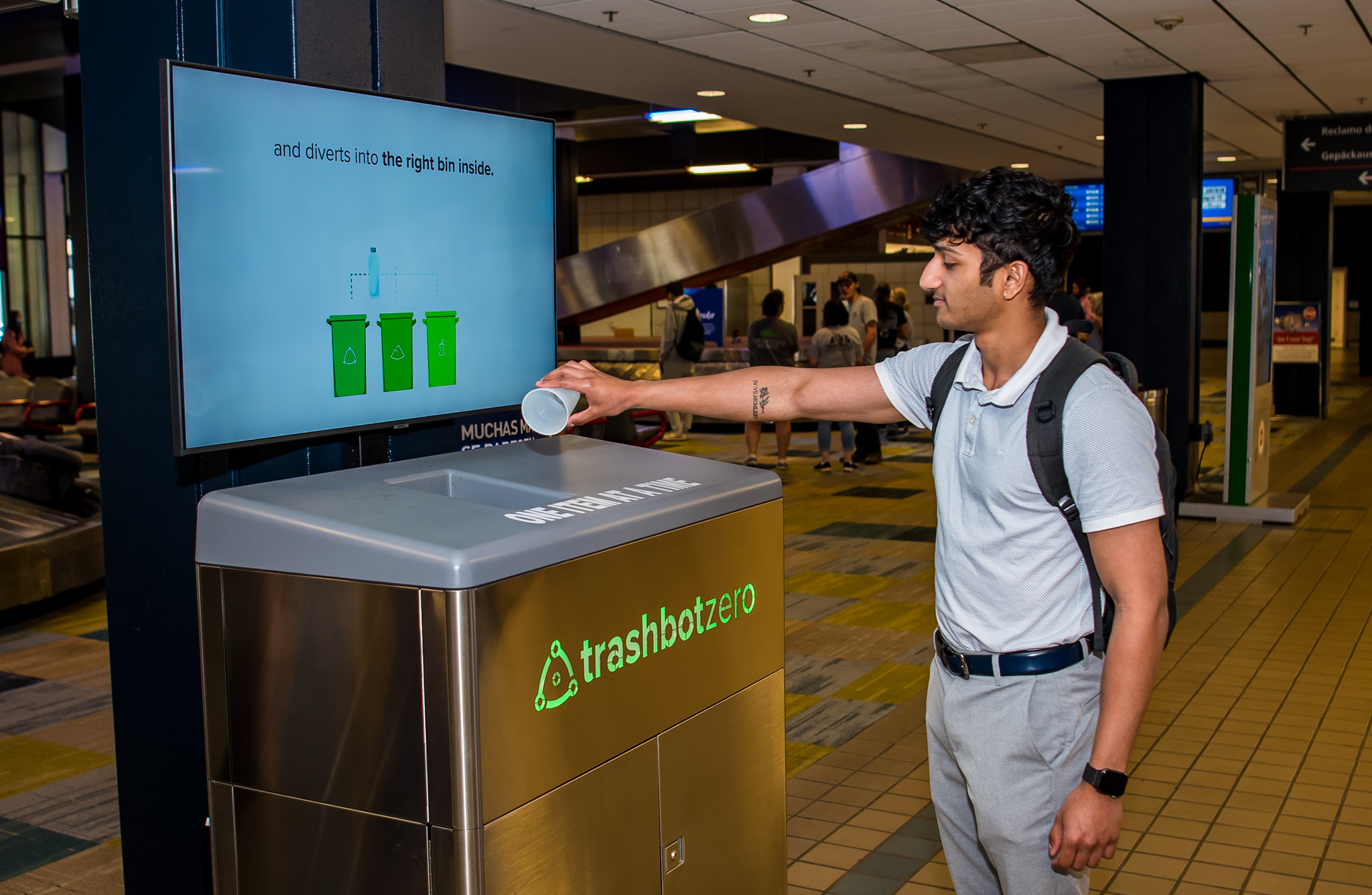
Smart Recycling and Garbage Can
CleanRobotics has developed the TrashBot, a sensor-enabled robotic garbage can that both separates garbage from recycling and provides business intelligence surrounding labor management, service levels, and use/stocking of waste supplies. During their proof of concept, a TrashBot unit was located in PIT’s Baggage Claim, where passengers were able to try out the TrashBot themselves. A user would place the item they want to discard in the TrashBot’s opening, and the TrashBot automatically sorted trash from recycling using AI and computer vision. The device also collected data on what and how much was being recycled, the diversion rate of waste not sent to a landfill, and more.

DIBZ – Concierge-style Texting Service to Improve Passenger Customer Experience
DIBZ uses QR codes to direct users to a text message workflow that can be used for a variety of purposes, from sales to information to customer experience. Starting in 2023, DIBZ and the Allegheny County Airport Authority partnered to conduct a trial of the DIBZ SMS platform for customer assistance in the airport parking lots. By scanning a QR code and then following text message prompts, passengers can request parking related information including shuttle arrival times, TSA wait times, flight information, directions, vehicle problems, ticketing and payment, and other assistance.